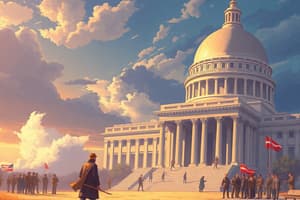Podcast
Questions and Answers
What is the aim of the chapter 'What is Democracy. Why Democracy.'?
What is the aim of the chapter 'What is Democracy. Why Democracy.'?
- To analyze the economic impact of democracy
- To compare different forms of government
- To explore the historical origins of democracy
- To understand the basic features of democracy (correct)
Why is democracy expanding to more countries?
Why is democracy expanding to more countries?
- Because it offers better economic opportunities
- Because non-democratic governments are failing
- Due to the influence of powerful nations
- As a result of increased global communication and awareness (correct)
What is Merry's objection to defining democracy in the chapter?
What is Merry's objection to defining democracy in the chapter?
- She believes that democracy has no common features
- She wants to focus on non-democratic governments
- She thinks that defining democracy is unnecessary
- She prefers a broader idea of democracy (correct)
What does the chapter aim to distinguish at the end?
What does the chapter aim to distinguish at the end?
Why is it important to understand the basic features of a democratic form of government?
Why is it important to understand the basic features of a democratic form of government?
According to Matilda Lyngdoh, why do we need a definition of a word?
According to Matilda Lyngdoh, why do we need a definition of a word?
Why does Matilda Lyngdoh mention the example of 'computers' in her discussion?
Why does Matilda Lyngdoh mention the example of 'computers' in her discussion?
What does Yolanda suggest about the meaning of the word 'democracy'?
What does Yolanda suggest about the meaning of the word 'democracy'?
In response to Ribiang's question, what does Matilda Lyngdoh clarify about the definition of democracy?
In response to Ribiang's question, what does Matilda Lyngdoh clarify about the definition of democracy?
Why does Merry propose approaching the concept of democracy in a different order?
Why does Merry propose approaching the concept of democracy in a different order?
What is the primary focus of this chapter?
What is the primary focus of this chapter?
Why does Merry object to the way democracy is defined in the chapter?
Why does Merry object to the way democracy is defined in the chapter?
What is the second major question addressed in this chapter?
What is the second major question addressed in this chapter?
What does the author aim to achieve by the end of this chapter?
What does the author aim to achieve by the end of this chapter?
According to Matilda Lyngdoh, why is it important to understand the bare minimum features of a democratic form of government?
According to Matilda Lyngdoh, why is it important to understand the bare minimum features of a democratic form of government?
Why is it significant to discuss why democracy is better than other forms of government?
Why is it significant to discuss why democracy is better than other forms of government?
What does Matilda Lyngdoh imply by stating 'We use words like pen, rain or love. Do we wait to have a definition of these words before we use them'?
What does Matilda Lyngdoh imply by stating 'We use words like pen, rain or love. Do we wait to have a definition of these words before we use them'?
Why does Matilda Lyngdoh mention that 'A word does not remain tied to its origin'?
Why does Matilda Lyngdoh mention that 'A word does not remain tied to its origin'?
According to Matilda Lyngdoh, when do we need a definition of a word?
According to Matilda Lyngdoh, when do we need a definition of a word?
Why does Merry propose approaching the concept of democracy in a different order?
Why does Merry propose approaching the concept of democracy in a different order?
What does Yolanda's suggestion about the meaning of the word 'democracy' imply?
What does Yolanda's suggestion about the meaning of the word 'democracy' imply?
What does Ribiang question regarding the definition of democracy?
What does Ribiang question regarding the definition of democracy?
Why does Matilda Lyngdoh clarify that 'We don’t know if this is the best way of defining unless we think about it ourselves'?
Why does Matilda Lyngdoh clarify that 'We don’t know if this is the best way of defining unless we think about it ourselves'?
In response to Ribiang's question, what does Matilda Lyngdoh clarify about the definition of democracy?
In response to Ribiang's question, what does Matilda Lyngdoh clarify about the definition of democracy?
What does Merry object to regarding defining democracy in the chapter?
What does Merry object to regarding defining democracy in the chapter?
Why is it important to understand the basic features of a democratic form of government?
Why is it important to understand the basic features of a democratic form of government?
Study Notes
Understanding Democracy
- The chapter "What is Democracy? Why Democracy?" aims to understand the concept of democracy and its significance.
Importance of Defining Democracy
- Matilda Lyngdoh emphasizes the need to understand the basic features of a democratic form of government to distinguish it from other forms.
- Defining democracy helps to identify its unique characteristics and differentiate it from other systems.
Objections to Defining Democracy
- Merry objects to defining democracy in the chapter, suggesting that the concept should be approached in a different order.
- Merry's objection implies that the conventional approach to defining democracy might be inadequate.
Understanding the Concept of Democracy
- Matilda Lyngdoh suggests that we use words like "pen", "rain", or "love" without waiting for a definition, implying that words evolve and their meanings can change over time.
- A word's meaning is not fixed to its origin, and its definition can change as our understanding of it grows.
- We need a definition of a word when we want to understand it more precisely or when we are uncertain about its meaning.
Distinguishing Democracy from Other Forms
- The chapter aims to distinguish democracy from other forms of government by the end of the discussion.
- Matilda Lyngdoh implies that understanding the bare minimum features of a democratic form of government is crucial to distinguish it from other systems.
Democracy's Expansion
- Democracy is expanding to more countries, making it essential to understand its features and significance.
Primary Focus
- The primary focus of this chapter is to understand the concept of democracy and its importance.
Key Questions
- The chapter addresses two major questions: "What is Democracy?" and "Why Democracy?"
- Ribiang questions the definition of democracy, and Matilda Lyngdoh clarifies that we need to think critically about the definition to understand it better.
Studying That Suits You
Use AI to generate personalized quizzes and flashcards to suit your learning preferences.
Description
Explore the fundamental concepts of democracy in this overview of Chapter 1. Learn about the features and characteristics of democracy, and distinguish between democratic and non-democratic forms of government.




